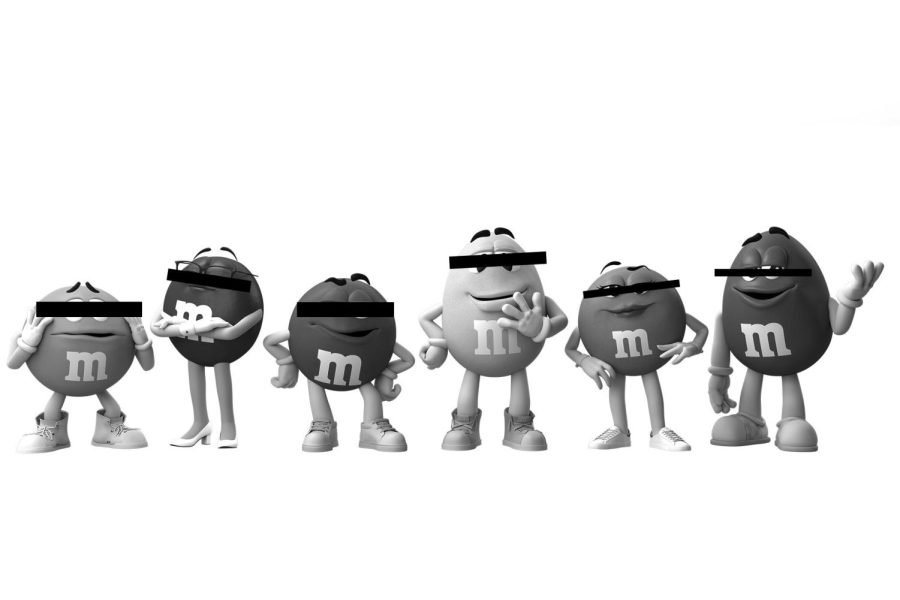We’re only two months into 2023 and in the wise words of Timothee Chalamet, “societal collapse is in the air.”
Russia violated national sovereignty by invading Ukraine. Blue collar families are struggling with skyrocketing inflation. Gun violence continues to escalate. Political divisions within the United States have reached a boiling point.
And M&M’s beloved spokescandies are being removed from shelves.
Mars Company announced last month it would pull its brand mascots after strong social media backlash in recent months.
The controversy surrounded redesigns of their iconic characters. The green M&M in particular ditched her heels in favor of a more comfortable (and less suggestive) pair of sneakers. Alongside the redesigns, each character was given a background story and core values. In Sept. 2022, the company added a purple M&M, which “represents self awareness, authenticity and confidence,” according to a press release.
It previously announced the revamped orange M&M will “acknowledge his anxiety.”
Me too. But I didn’t put out a press release for it.
Mars Company further explained the character redesigns, stating that the backstories and wardrobe changes were made to fit in a “more dynamic, progressive world.”
Dynamic and progressive: the two words I associate with colorful chocolate candies.
Fox News pundit and former “Crossfire” host Tucker Carlson lamented the change in character design on his show, declaring: “M&M’s will not be satisfied until every last cartoon character is deeply unappealing and totally androgynous. When you’re totally turned off, we’ve achieved equity. They’ve won.”
If the M&M’s aren’t sexy, Carlson wants no part in it.
He even labeled the company as woke — whatever that means.
After some outrageous politically-charged responses, M&M spoke out.
“America, let’s talk,” the company tweeted last week. The post went on to say that polarization “was the last thing (we) wanted since we’re all about bringing people together.”
In the M&M’s places, the company announced that comedian Maya Rudolph—known for her role as Kamala Harris on Saturday Night Live—will fill in. Whether or not the original characters return, this change is unprecedented for the company.
Call me a conspiracy theorist, but the now-infamous M&M rebrand may have been more of a distraction than a genuine transformation of the company.
There are two things to address with this controversy:
First, it’s unlikely that Mars Company cares deeply about progressive ideals.
In recent years, more and more brands have engaged in virtue signaling. During Pride Month and Black History Month, companies change their logos to show solidarity–only to remove it immediately as the calendar flips.
Many of those same companies champion trendy social movements, but don’t put any money towards them. For an example, look no further than Pepsi’s infamous ad wherein Kendall Jenner solves police brutality by handing the officer a refreshing can of soda.
M&M isn’t removed from scandal either.
The company was implicated in a lawsuit regarding its exploitation of child labor, according to a report from The Guardian.
Call me a conspiracy theorist, but the now-infamous M&M rebrand may have been more of a distraction than a genuine transformation of the company.
In many cases, corporate activism rings hollow. M&M’s attempts to be more progressive as a company are certainly preferable to being exclusionary and bigoted, but their elaborate marketing is wildly unnecessary.
Second, I don’t want to hear conservative pundits complain about “cancel culture” when they’re directly engaging in it. If talk show hosts like Tucker Carlson are so in favor of free markets and capitalism, their opposition to a brand engaging in a financially advantageous marketing strategy is illogical.
The reality is that they only dislike “cancel culture” when it disadvantages them politically.
In the 1960s, southerners burned The Beatles’ records in response to their comments on religion.
Nearly 40 years later, The Chicks, despite critical acclaim and a dedicated fanbase, were blacklisted from country radio stations for criticizing George W. Bush.
In recent years, anything labeled as woke has received heavy criticism.
M&M’s marketing strategy is ridiculous, but the backlash has been even more absurd. Wars are going on overseas and costs are crushing the majority of the country.
It’s 2023. We have to focus on more pressing matters than an M&M’s anxiety and shoes.










